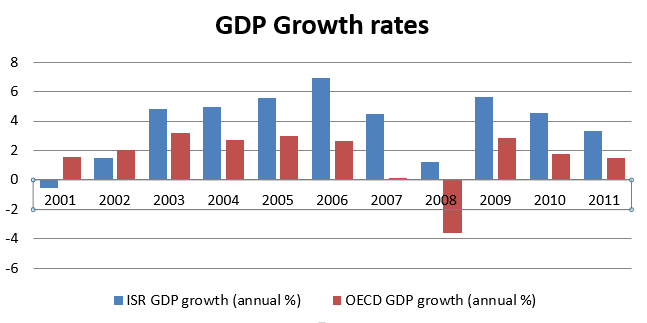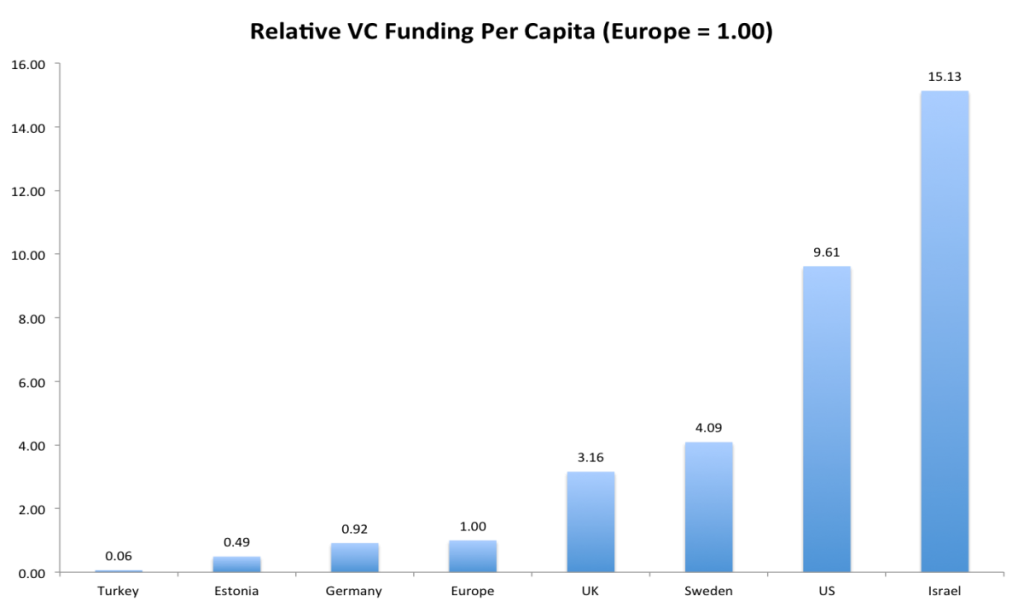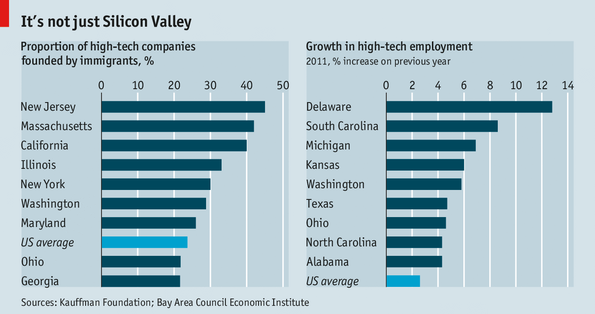
“The only natural resource we discovered is the human potential.
Israel is an example where the people enriched the land more than the land enriched the people.”
– President Shimon Peres, from his EU parliament speech
In their book “Start-up Nation: The story of Israel’s economic miracle”, authors Dan Senor and Saul Singer describe why and how Israel became the second largest start-up scene in the world, just behind Silicon Valley. There are more Israeli companies on the NASDAQ (US high-tech stock exchange) than Korea, Japan, Singapore, India and all of Europe combined! Israel is much too often depicted in Europe as a liberal democracy in a hostile neighborhood at best, and as the occupier or tormentor of the Palestinians at worst.
Yet Europeans tend to forget that there is much more to Israel than just the Arab-Israeli conflict. Israel is a liberal democracy that shares the same values as we do. Despite facing existential threats it has a vibrant entrepreneurial scene, R&D centers at the cutting edge of technology, a modern growing economy and above all human capital put at work. Israel has a lot to learn from Europe but the opposite is also true.
Against All Odds
“Israel has the most important high-tech center in the world after the US.”
-Eric Schmidt, Chairman of Google Inc.
One might think that a country of only 8 million people and in a perpetual state of war like Israel would be less willing to take risks and be more prone to instability and economic decline, the opposite is true. Because Israel faces existential threats from its neighbors and because it has been boycotted by every Arab country; it had to innovate, take risks and look for markets beyond its environment in order to survive and to be successful in the world economy. Its adversity driven character made it ready to take full advantage of the opportunities that globalization creates.
Like Taiwan, South-Korea or Singapore, small developed countries in high-tension conflict areas, it has experienced growth rates that Europeans today can only dream of. They even outperform the average growth rates of developed countries.

Source: World Bank Data
In their book, Saul and Singer reveal the secret ingredients for Israel’s economic success. They discard the ethnic or religious stereotypes; rather they attribute its success to a mix of venture capital, immigration policy, mandatory military service experience, research and development… all fostered by a people that overcame adversity against all odds.
It is the country that gave birth to: Viber (messaging app), Netafim (drip irrigation tech), Waze (navigation app), Fraud Sciences (anti-fraud system), Given Imaging (a pioneer in capsule endoscopy technology) and many more. Particular about Israeli startups is that, while they’re very successful at an early-stage, they are much too often taken over by foreign tech giants. For example; Viber was recently sold to Japanese Rakuten for $900million, Fraud Sciences was acquired for $169million by Ebay, Waze was sold to Google, Onavo to Facebook etc.
While you may have rarely or never heard of these companies, their impact is non-negligible. It might be a surprise for you to hear that American tech corporations such as Intel and Microsoft built their first overseas R&D centers in Israel. Google suggest tool that you probably use every day and Intel’s dual-core Core Duo processors were designed by their Israeli centers.
The European Start-up Scene
One of the reasons for Israel’s start-up successes is its Venture Capital industry. Venture Capital (VC) is financial capital provided to early-stage, risky, full of potential start-up companies. Indeed, how can a start-up grow and expand without any investor willing to risk their capital into the project? Especially when faced to the high failure rate of start-ups that lies around 75%-90%.
Nevertheless, failure should not be stigmatized or seen as an obstacle. Henry Ford failed three times before succeeding. His first company “Detroit Automobile Company” went bust in 1901, a year later he left “Henry Ford Company” due to a fight with his partner and co-founded a third company called “Ford & Malcomson Ltd” which almost went bankrupt due to low sales until it was saved by another group of investors and reincorporated as “The Ford Motor Company” in 1903.
European venture capital has performed poorly compared to the US and Israel. Difficulty to operate across different regulatory and legal jurisdiction, to invest across borders, fiscal unfavorable regimes and all kind of barriers to entrepreneurship have made it difficult for European venture capital development. Legal and fiscal barriers can be overcome through more coordination, reform and integration at European level but psychological and cultural barriers towards entrepreneurship in Europe still remain.

Venture Capital funding US-ISR-EU, Source : VentureSource
Bankruptcy and failure in business are stigmatized, risk aversion amongst Europeans is higher, the precautionary principle or “better safe than sorry”-principle is a general principle of EU law, whereas the US and Israel have a dynamic entrepreneurial economy, failure is not stigmatized but is part of the entrepreneurial learning experience; it is better to have tried and failed than not to have tried at all.
“… At the moment Europe has huge reservoirs of scientific talent, but a very poor record at creating start-ups. The question many investors ask is: where is the European Google? It’s a fair question.”
– Irish economist David McWilliams, excerpt from “Start-up Nation”
Europe doesn’t lack potential or capital, there’s plenty of talent in Europe; our universities, research centers, infrastructure are amongst the best in the world. Sweden, Denmark, Ireland and Finland, despite being small are Europe’s most innovative and competitive countries. They gave birth to high-tech companies such as Spotify and Skype.
Not everything is gloomy in Europe, there is a vibrant start-up scene in Berlin, London, Finland… but it is still too small in comparison to Israel and the US. Finns for instance, despite producing enormous amount of patents have failed to capitalize on them in the form of new start-ups.
Battlefield Entrepreneurs
Chutzpah (pronounced as hutsp’ or chutsp’): behavior, or a person’s attitude, that is rude or shocking but so confident that people may feel forced to admire it.
Chutzpah, the ‘audacity’ to do the impossible is enshrined in Israeli culture. From a very young age and during military service, Israelis are encouraged to question hierarchy and are taught that they can achieve anything in life as long as they make bold well-thought decisions.
Tsahal, the Israeli Army, has been an essential factor in the success of start-ups. By training its recruits in high-tech, giving them responsibility at a very young age and promoting leadership, it has created battlefield entrepreneurs. While elite status in the US is determined by which Ivy League university (Harvard, Yale …) you attended; in Israel it’s in which military unit you served that matters.
A tailored European optional military conscription program or US-like ROTC-program (Reserve Officers Training Corps), which is an integrated military program in academic curricula, could foster leadership, camaraderie, training in high-tech, a European identity and produce the future battlefield entrepreneurs that we desperately need for jobs and growth.
Immigration
“Immigrants are not averse to starting over. They are, by definition, risk takers. A nation of immigrants is a nation of entrepreneurs.”
– Gidi Grinstein, Reut Institute
Israel like the United States is a start-up nation, built by immigrants. It is not surprise that one reason for their success is their ability to attract, integrate and give opportunities to immigrants from diverse backgrounds. After the collapse of the Soviet Union, Israel had to absorb almost 1 million Soviet immigrants, a fifth of its population and all that in less than a decade.
Most of them were highly-skilled and have contributed to the high-tech start-up boom the country has experienced. Immigrant societies are entrepreneurial because immigrants are by definition risk takers. The heir and executive of an established family business in France will be less likely to leave and risk everything in order to create something new. Immigrants on the other hand have nothing to lose; they only see what they can win.
More than 200 of the Fortune 500 companies in the US have been founded by immigrants or their children; Ebay was founded by a French-Iranian, Intel by a Hungarian, Yahoo by a Taiwanese, Google by a Russian, Instagram by a Brazilian and the list goes on. These 200 companies produce $5 trillion in revenue for the US economy and employ almost 10 million people worldwide. Immigrants also contribute to more than 25% of patents in the US.

Source: The Economist
Europe faces a demographic crisis like Japan, aging population and the ‘baby-boomers’ retiring isn’t good news for the already slow growing European economy. The ability of Europe to attract, keep and integrate talented individuals from the 5 corners of the world will be essential for Europe’s future. The EU is an immigration experiment in itself, it’s still a work in progress but it has neglected to deal with immigration outside the EU effectively.
Politics, the least to say, has become nasty towards immigrants. How do we expect talented Indian, African or Chinese: programmers, engineers, scientists … to find Europe attractive when political discourse is negatively directed towards them?
We need to create a “European dream” that attracts talented young people and gives them the opportunity to grow their business in Europe. We have the potential to produce the next European Google, but only by acting European and taking advantage of the opportunities of globalization instead of looking inwards, will we be successful.
What Europe really needs is entrepreneurial and political chutzpah. Audacity to face and shape the world we live in. The EU itself would have never existed if it wasn’t for the audacity and chutzpah of its founding fathers.
Hamza Serry-Senhaji is a pan-European activist who is currently a board member of JEF Brussels. His monthly column, The Pan-European Pen, brings focus to topics that are crucial for a common European future. Contact him directly via email or Twitter.
Related articles






